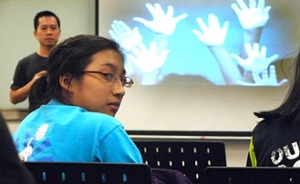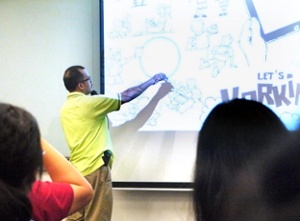 Thirty future entrepreneurs aged 16-20 from TYE joined us on Friday afternoon. They sat in on our weekly demo day rehearsal and it was great to see that they had no hesitation putting up their hands to ask incisive questions. Yet one of those questions left me puzzled. It made me ask: are we bringing up a generation of ‘digital natives’ who will never learn to talk confidently face to face?
Thirty future entrepreneurs aged 16-20 from TYE joined us on Friday afternoon. They sat in on our weekly demo day rehearsal and it was great to see that they had no hesitation putting up their hands to ask incisive questions. Yet one of those questions left me puzzled. It made me ask: are we bringing up a generation of ‘digital natives’ who will never learn to talk confidently face to face?
Before you write off what follows as a rant about the youth of today, let me say that I love the energy you get when you put 30 teenagers in a room. Everything is possible. Excite them with a great pitch, as Bullitt Sesariza from our startup team Kark did, and they start oooh-ing and ahhh-ing with approval.
Then Bullitt stepped on a landmine. His team’s prototype creates a new way for children to explore the world using interactive simulation. They call it Karking. That was a big hit with the audience. But the idea that it was designed to get kids physically next to each other and playing in the same space horrified our young audience. Why can’t they play remotely using social media, they asked.
I was stunned.
 You mean … you don’t actually want to spend time with other people? You don’t want to have fun together? You’d rather send IM?
You mean … you don’t actually want to spend time with other people? You don’t want to have fun together? You’d rather send IM?
My first reaction was to wonder if this was a peculiarly Singaporean thing.
Kids here tell me that they spend so much time doing ‘enrichment classes’ (ie cramming for exams) that they just don’t have time to play as teenagers. Maybe that’s one reason why some Singaporeans feel that their youngsters aren’t developing the social skills they will need when they stop trying to pass exams and move on to start living, to get jobs and find life partners.
However, a recent HBR article puts the blame on technology. It suggests that this is far from being just a Singaporean thing.
Now I am always suspicious of the argument that new technology is frying our kids brains and turning them all over to be mauled by paedophiles. I am just as suspicious of claims that new technology will bring world peace and bliss for all fluffy animals too. I made a film about this 20 years ago: it seems that every new technology brings utopian and dystopian visions in equal measure. For example, it was predicted that:
- Robots would either bring us a life of leisure, or they would enslave us. Truth is nobody (except the Japanese) seems to really like the idea of a clanking metal butler around the home. The rest of us make do with automatic washing machines, voicemail and pop-up toasters.
- Air travel would bring world peace and a harmony of nations in the heavens, or it would bring blitzkrieg and total war. Well Singapore Airlines would still like us to believe the former and Adolf Hitler tried the latter. Neither quite delivered on the promise.
- Plastic would create a wipe-clean, fuss-free world where there are no sharp corners to injure children. Or it will shrivel our testicles and cripple our fertility with dioxins. Hmm. Maybe those are both true. I’d like to think that science and recycling will resolve that one in a sensible way before we run out of oil to make plastic.
Whatever the truth on these future-myths, in the real world Malcolm Gladwell pointed out that it takes maybe 10,000 hours to master a skill. I guess that’s as true for conversation as anything else.
Over the last five years I have had the privilege of meeting five daughters of Ambassadors. They ascribe their ability to keep a conversation going to years of experience making small talk with tedious trade missions, dignitaries and the Great and the Good at cocktail parties. The Art of Conversation may not be something at which we all need to be expert, in the sense of knowing when to cock our fingers as we drink tea, but surely it is something at which we need to be competent if we are to function as human beings.
Perhaps it is not the niceties of small talk or diplomatic etiquette that most of us need to master. Rather, it is simply the art of being together. On a very practical level, I once spent two weeks in Kenya with a friend from University and his sister. They lived in the Rift Valley on a farm with no running water and no electricity supply. They did have a generator but it only came on in the evening and it made just enough power to fire up the lightbulb (there was only one), or the radio (permanently tuned to the BBC world service).
Arthur and his sister had grown up having to make their own entertainment. As many people still do across Asia, in a way that most folk in the “developed” world have forgotten. My grandfather was born in 1886 and his generation thought it strange if an evening with friends did not end in communal singing, at a time when the ”gramophone” was still a novelty. No KTV for them.
In our age, some folk in the west are now paying for courses to go and learn how to be together. A decade or more back, wannabe standup comedian Lee Glickstein was crippled by stagefright and developed a technique for public speaking that he calls Relational Presence. When he found out how powerful it was one on one, he gave up comedy. Now he spreads the good news that joy can come from simply being with people, if you make the effort.
One of our mantras at JFDI.Asia is that the next billion people are coming online across our region. I do hope they don’t forget how to talk to each other face to face as well.


Start a JFDI Toastmasters club 🙂
Now there’s a thought. Meng could get a red toast master’s coat made. Or maybe we should get him a special green one, like a frog
Heh. Hugh, I think you might have misinterpreted that girl’s question. This is what I understood of it.
She said that Kark seems to be targeting children in the 5 to 10 year range. But 5 to 10 year olds do not own tablets. They use their parents’ tablets. And parents rarely let those tablets out of their sight.
Parents don’t let their 8 year olds take their tablets to school.
And parents don’t host playdates for their 8 year olds on a daily basis.
So, for the target age range, children do play together (at school); children do play on tablets (at home); but children do not play together on tablets, because they are denied that opportunity.
And that is why the girl suggested that an online mode of social interaction might be necessary for the product to succeed. She wanted to play together using social media because if she wanted to use the product together with her friends, there was no other choice, and the product as demo’ed did not have that feature!
I thought that was a perfectly astute point and having gotten this feedback it would be first a mistake to misinterpret it and second unbecoming to ridicule the person who gave it.
Thanks for that Meng – I do recall the girl’s point to which you refer and I agree about its validity. However we may be writing at cross purposes because I was responding to a young male questioner in the audience.
For the record, I don’t seek to ridicule anyone. If that’s what comes across, I apologize unreservedly. Likewise if I have misinterpreted what was said in a fast-moving discussion to which many contributed. I just think it’s incredibly sad if, for whatever reason, kids don’t have the opportunity to play together regularly in the same physical space. If that’s the reality for many kids today, I suggest it’s a key reason why children won’t develop social skills in later life. They won’t be able to collaborate in teams and they will find it difficult to form successful life-partnerships.
Maybe it’s a different demographic in which I live, but the kids I know in the age range we are discussing do hang out with their friends after school, several times a week. When there are adults in the room to make sure tablets don’t get broken, I very definitely see kids playing together around them. Sometimes friends, sometimes siblings, and also children and their parents.
OK, maybe now we’re getting into Susan Cain territory, heh. Social skills do matter – but so do other skills which can only be developed in solitude.
On the whole I do agree that in the social-skills department Singapore and East Asian kids tend to be a few years behind their Western counterparts.
Some never catch up.
For those following this discussion, Nisbett’s Geography of Thought elaborates.